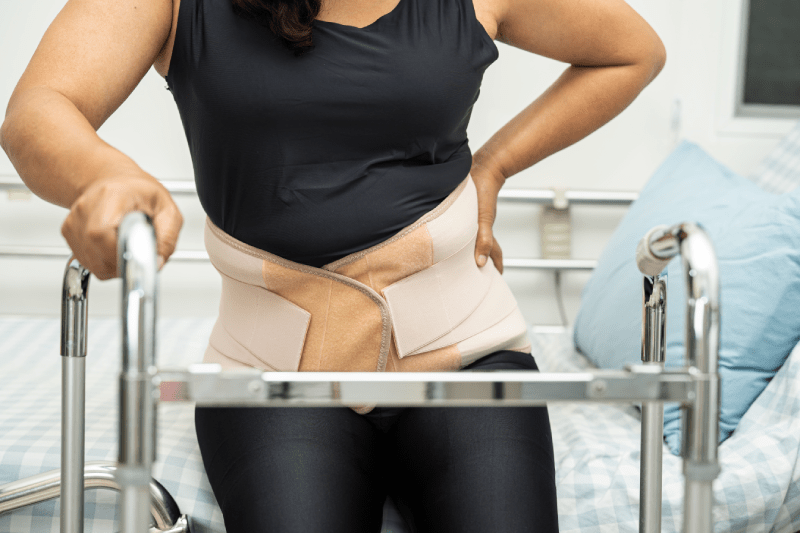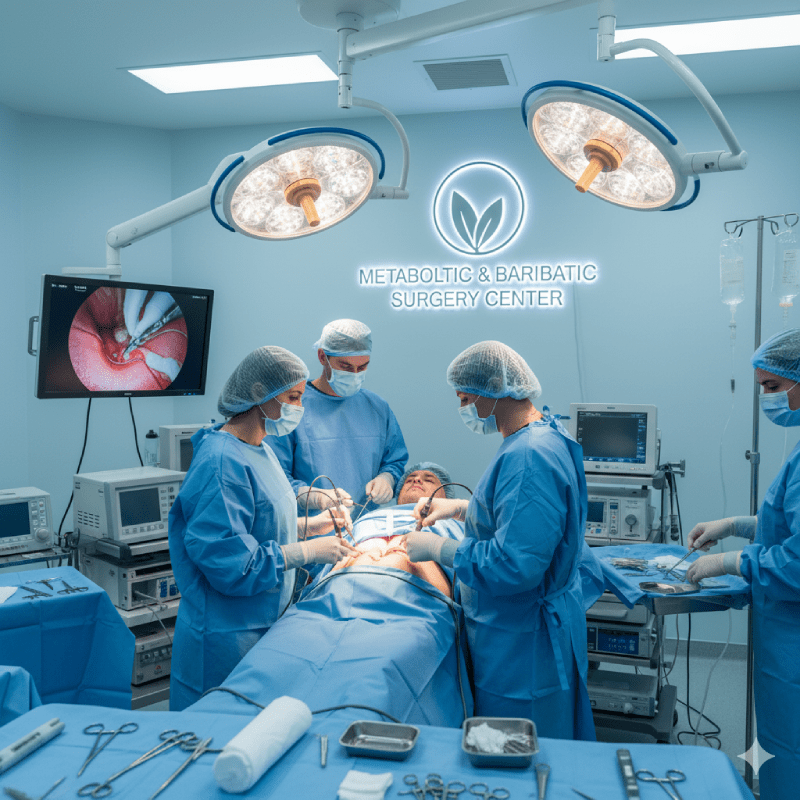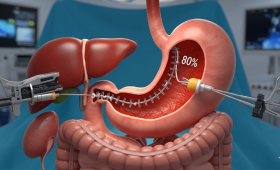What Is The Average Cost Of Gastric Sleeve Surgery In Turkey?
The average costs for Gastric Sleeve surgery (Sleeve Gastrectomy) in Turkey are quite economical compared to prices in Europe and North America. Prices generally vary depending on the scope of the package, the international accreditation level of the hospital where the surgery will be performed, and the surgeon’s experience.
Turkey’s cost advantage stems from its competitive healthcare sector and the favorable exchange rate; however, this does not imply a compromise on the quality of service provided. For a definite and personalized price quote, it is recommended that you contact Cure Holiday with your full medical history to request a detailed analysis.
Which Services Are Included In The Package Price?
Comprehensive Gastric Sleeve packages are generally designed to include much more than the surgical procedure itself. A standard package includes all mandatory pre-operative laboratory and radiological tests, surgical team and anesthesia fees, accommodation during the hospital stay (usually 3 nights), consumables used, initial medications, and dietitian consultations.
Additionally, logistical services for international patients, such as accommodation, airport transfers, and language support (translation) throughout the process, are also part of the package. These comprehensive services are offered to ensure your recovery process is smooth and stress-free.
Why Are Costs More Affordable In Turkey?
The main reasons why Gastric Sleeve surgeries are more affordable in Turkey are the relatively low general cost of living and labor costs in the country, combined with high competition in the field of health tourism. The most significant advantage for foreign patients arises from the exchange rate difference, resulting from the value of the Euro, Dollar, or Sterling against the Turkish Lira. The combination of these factors allows the total cost to remain significantly lower, despite providing Western-standard services and operating in state-of-the-art hospitals.
What Are The Main Factors Affecting The Price Quote?
The primary factors directly influencing the price quote include the patient’s current health status and Body Mass Index (BMI). Surgeries for patients with a high BMI or additional chronic diseases (such as diabetes, high blood pressure) may increase the cost, as they might require longer operating times or special precautions. Furthermore, the surgeon’s experience, the hospital’s technological equipment and international accreditations, and the quality of luxury services included in the package, such as accommodation and transfer, also have a decisive impact on pricing.

Are Accommodation And Transfer Services Included In The Fee?
Most Gastric Sleeve packages targeting international patients include accommodation and VIP transfer services as standard to ensure the patient’s comfort and safety. These services usually cover the patient’s pick-up from the airport, all transportation between the hospital and the hotel, and accommodation for a specific period (usually 5-7 nights) in a comfortable hotel where they will spend their post-operative recovery period. These logistical arrangements allow the patient to focus solely on recovery and minimize the stress associated with being in a foreign country. You can contact Cure Holiday for all the details.
Are All Pre-Operative Tests Covered By The Package?
Yes, all mandatory medical assessments and tests required before surgery are typically included in the package price for comprehensive Gastric Sleeve packages. These tests are critically important for determining whether the patient can safely undergo general anesthesia and the surgery. Standard tests include detailed blood analyses, ECG, chest X-ray, and, where necessary, gastric imaging such as endoscopy. In this way, when you arrive in Turkey, the entire preparation process is completed quickly and in an organized manner within the hospital environment.
What Should Be The Ideal Body Mass Index (BMI) For Gastric Sleeve?
The ideal candidates for Gastric Sleeve (Sleeve Gastrectomy) surgery are generally individuals with a BMI of 40 and above. However, individuals with a BMI between 35 and 40 who have serious co-morbidities such as obesity-related type 2 diabetes, sleep apnea, or high blood pressure are also considered eligible for the surgery. Patients with a BMI between 30-35 whose type 2 diabetes cannot be controlled despite lifestyle changes may also be evaluated under certain criteria. The decision is made by the surgical team following a comprehensive medical analysis.
Who Is Suitable For Gastric Sleeve Surgery?
Suitable candidates for Gastric Sleeve surgery are individuals who are struggling with obesity, have tried other weight loss methods but failed, understand the risks and long-term consequences of the surgery, and are committed to change. Candidates are expected to be at least 18 years old, have an acceptable BMI for surgery, and not have a severe psychiatric disorder. Furthermore, individuals with a history of alcoholism or substance abuse and those with eating disorders are generally not considered suitable for the operation. Success depends on the patient’s motivation to adapt to lifestyle changes.
Are Age Limits And Chronic Diseases An Obstacle?
While the lower age limit for Gastric Sleeve surgery is generally accepted as 18, the upper age limit can be flexible based on the patient’s general health condition; patients over 65 may also be deemed suitable. Chronic diseases (such as diabetes, heart disease, etc.) are not an obstacle on their own; on the contrary, controlling these diseases is one of the primary goals of the surgery. However, whether chronic diseases increase the surgical risk is evaluated with detailed tests by cardiologists and internal medicine specialists. Surgeon approval is vital for the safety of the surgery.
What Kind Of Preparation Process Is Required Before Surgery?
The pre-operative preparation process involves physical, nutritional, and psychological evaluations. The patient is asked to follow a special protein-focused diet to increase the safety of the surgery and reduce the size of the liver. During this period, the use of all blood thinners, certain vitamins, and herbal supplements must be stopped under the supervision of a doctor. Furthermore, the patient is aimed to be fully ready for the surgery through consultations with a dietitian and psychologist to ensure adaptation to the post-operative nutrition plan.
Should A Special Diet Be Applied Before Surgery?
Yes, following a high-protein, low-calorie, liquid, or semi-solid pre-operative diet for usually 1 to 3 weeks before Gastric Sleeve surgery is mandatory. The main purpose of this diet is to facilitate the surgery and reduce the risk of complications. It reduces the size of the liver, providing the surgeon with a better field of vision, and decreases the fatty tissue around the stomach. Since the success of this diet directly affects the comfort and safety of the post-operative period, strict adherence to the doctor’s and dietitian’s instructions is required.
How Long Before Surgery Should Smoking And Alcohol Be Stopped?
Smoking and alcohol must be stopped before surgery as they significantly increase the risk of post-operative complications and wound healing time. Surgeons ideally require smoking to be completely ceased at least 4 to 6 weeks before the operation. A similar period is advised for alcohol consumption. Nicotine reduces blood flow to tissues, slowing down wound healing; alcohol can negatively affect the liver and the anesthesia process. These restrictions must also continue throughout the initial post-operative recovery period.
How Is The Gastric Sleeve Procedure Performed?
The Gastric Sleeve procedure involves the permanent removal of approximately 75-80% of the stomach. The surgery is generally performed using a minimally invasive technique called laparoscopy (keyhole surgery). The surgeon inserts specialized instruments and a camera (laparoscope) through small incisions made in the abdominal area. The stomach is shaped into a vertical tube, and since the removed part (including the fundus) contains a large portion of the appetite hormone ghrelin, both volume restriction is achieved and the hormonal feeling of satiety is increased.
Is The Surgery Performed Using The Laparoscopic Method?
Yes, the vast majority of modern Gastric Sleeve (Sleeve Gastrectomy) surgeries are performed using the laparoscopic method (keyhole surgery), which is considered the gold standard for patient comfort and rapid recovery. Laparoscopic surgery only requires a few small incisions (0.5 to 1 cm) in the abdominal area. This method offers the advantages of less pain, shorter hospital stay, faster recovery, and much less noticeable scarring compared to traditional open surgery.
How Long Does Gastric Sleeve Surgery Last?
The duration of Gastric Sleeve (Sleeve Gastrectomy) surgery varies depending on the surgeon’s experience, the patient’s body structure, and whether the surgery encounters any technical difficulties. However, generally, the completion of the surgery, excluding preparation for and waking up from anesthesia, takes between 1 and 2 hours. With the laparoscopic method becoming standard, operation times have been highly optimized, and patient safety has been prioritized.

Which Part And How Much Of The Stomach Is Removed?
In Gastric Sleeve surgery, approximately 75% to 80% of the stomach is permanently removed. The removed portion includes the large and flexible outer curvature of the stomach and particularly the part called the fundus, which produces a large part of the appetite hormone (Ghrelin). The remaining part of the stomach takes the shape of a banana or a thin tube (sleeve), resulting in a small volume. This surgical reduction both physically restricts food intake and leads to a decrease in appetite, promoting weight loss.
Is This Procedure A Reversible Operation?
No, the Gastric Sleeve (Sleeve Gastrectomy) surgery is not a reversible operation because a large portion of the stomach is permanently removed from the body. This is a fundamental difference from Gastric Bypass, another popular method in Bariatric surgery, where procedures can be reversible. The permanent nature of the Sleeve Gastrectomy requires the patient to make this decision definitively before the surgery. However, in cases of insufficient weight loss or severe complications in the future, the remaining stomach part can be converted to another procedure like Gastric Bypass (revision surgery).
What Are The Possible Risks Of Gastric Sleeve Surgery?
Like any major surgical procedure, Gastric Sleeve surgery has potential risks and complications. The most important and serious risks include leakage from the staple line of the stomach, bleeding, infection, anesthesia-related risks, and, rarely, deep vein thrombosis (blood clotting). Thanks to experienced surgeons, modern surgical techniques, and strict safety protocols applied in hospitals, these risks are kept at minimal levels. Detailed pre-operative tests and risk assessment are an important part of this process.
How Is The Risk Of Leakage Reduced?
Leakage is the most serious complication of Sleeve Gastrectomy, meaning the leakage of digestive fluid from the stomach staple line. This risk is reduced through the surgeon’s experience, the use of staple line reinforcement supplements during the surgery, and careful post-operative management. Restriction of the patient’s oral intake in the first days after the surgery, continuous medical observation, and tests performed to detect leakage are also important. The patient’s adherence to stopping smoking and following the doctor’s instructions also plays a vital role in reducing the risk of leakage.
Are Vitamin And Mineral Deficiencies Permanent?
Vitamin and mineral deficiencies can occur after Gastric Sleeve surgery, but these deficiencies are not permanent with proper management. Since only the volume of the stomach is reduced and the passage of nutrients to the small intestine is unchanged, absorption problems are less severe compared to Gastric Bypass. However, because less food is consumed due to the reduced stomach volume, supplements such as B12, Vitamin D, iron, and calcium must generally be used life-long under the supervision of a doctor and dietitian. Regular blood tests and adherence to the supplementation program are essential to prevent deficiencies.
Is There A Decrease In Nutrient Absorption After Surgery?
In Gastric Sleeve surgery, although the stomach’s volume is reduced, there is no significant absorption disorder because the path and time for nutrients to reach the small intestine do not change. Small reductions in absorption are generally caused by insufficient nutrient intake or changes in gastric acid secretion. Therefore, it is important for patients to regularly use protein and vitamin-mineral supplements and consume foods recommended by the dietitian. This plays a critical role in preventing nutritional deficiencies and sustaining healthy weight loss.
Is Long-Term Weight Regain Possible?
Yes, although Gastric Sleeve surgery is a successful start, long-term weight regain is possible (especially after 5 years post-surgery). The surgery is a tool; ultimate success depends on how committed the patient is to lifestyle changes. Key reasons for weight regain include neglecting post-operative nutritional rules, shifting towards high-calorie liquid and soft foods, and not engaging in regular exercise. A disciplined diet and active lifestyle are essential for ensuring the permanence of the results.
How Many Days Is The Hospital Stay Usually?
The hospital stay for Gastric Sleeve (Sleeve Gastrectomy) surgery is relatively short because the procedure is performed laparoscopically. Patients generally stay in the hospital for 3 nights, including the day of surgery. During this time, close post-operative monitoring is performed, safety checks like the leakage test are conducted, and pain management is provided. The patient is expected to start liquid intake and begin minimal movement. At the end of the third day, with the surgeon’s approval, patients can transition to the recovery period at the hotel.
How Is Post-Operative Pain Management Handled?
Post-operative pain is less severe compared to traditional open surgery due to the small incisions but is still present. During the hospital stay (3 days), pain control is achieved with strong painkillers administered intravenously. After discharge, oral painkillers prescribed by the surgeon are used regularly. The intensity of pain peaks within the first 24-48 hours and then rapidly decreases. Strict adherence to pain management instructions is critical for a more comfortable recovery and early movement.
Which Nutritional Stages Are Followed During The Recovery Process?
Nutrition after Gastric Sleeve is a critical and gradual process for the stomach to heal and adapt to its new volume. It generally consists of 4 stages: Clear Liquids (first 1-7 days), Full Liquids (days 7-14), Pureed Foods (weeks 3 and 4), and finally Soft Solid Foods (from week 5 onwards). Each stage is adjusted according to the stomach’s tolerance. Strict adherence to these stages under dietitian supervision minimizes the risk of leakage and other complications.
When Is The Return To Normal Solid Foods?
The transition to normal solid foods usually occurs around 6 to 8 weeks after the surgery, with the full approval of the surgeon and dietitian. This process begins with soft solid foods and gradually moves to foods with a normal texture. However, patients should remember that portion sizes have shrunk and that they must avoid hard, dry, or fibrous foods that challenge the stomach. Chewing every bite thoroughly and eating slowly are fundamental rules that must be maintained for life.
Why Is Water Consumption So Important After Surgery?
Water and fluid consumption after surgery is vital for preventing dehydration (fluid loss) and supporting overall recovery. Since the stomach volume is reduced, it becomes difficult for patients to take large sips at once. Therefore, continuous fluid intake in slow and small sips throughout the day is mandatory. Dehydration can lead to fatigue, dizziness, and serious kidney problems. Furthermore, fluids should be consumed at least 30 minutes before or after meals to prevent the stomach from feeling too full with food.
When Can Exercise And Sports Be Started?
Light exercises and walking should be started immediately after discharge from the hospital (with surgeon’s approval) to increase blood circulation and reduce the risk of clotting. However, waiting generally 6 to 8 weeks is necessary for sports that strain the abdominal muscles, require heavy lifting, or intense cardio. This period is required for the surgical incisions to fully heal and for the internal tissues to strengthen. Exercise should become a regular part of life after recovery to accelerate weight loss and preserve muscle mass.
Is Hair Loss Experienced After Surgery?
Yes, temporary hair loss is quite common after Gastric Sleeve surgery, especially 3 to 6 months post-operation. This shedding is generally caused by the stress response of the body to the surgery, rapid weight loss, and sudden changes in the nutritional regimen (Telogen Effluvium). To minimize hair loss, attention must be paid to adequate protein intake and essential vitamin supplements such as iron, zinc, and B vitamins. This shedding usually resolves on its own once the body stabilizes.

What Should Be The Minimum Stay In Turkey?
The minimum recommended stay in Turkey for Gastric Sleeve surgery is generally 7 to 10 days to ensure safe recovery and the completion of necessary post-operative checks. After the 3 days spent in the hospital, the remaining time is used for rest at the hotel and the first important check-ups under the surgeon’s supervision. This period is critical for the surgeon to check wound healing before the flight, confirm the overall condition, and ensure the patient is safe for the long flight.
What Is The Expected Weight Loss Rate?
The expected excess weight loss rate for patients with Gastric Sleeve surgery is quite high. Patients generally lose 60% to 70% of their excess weight within the first 12 to 18 months following the surgery. This rate can vary from person to person depending on the starting BMI, age, and the patient’s adherence to the diet and exercise program. Rapid and continuous weight loss is observed during the first 6 months, while the stabilization process takes longer.
When Does Weight Loss Occur Most Significantly?
The period when weight loss is fastest and most intense is the first 6 months following Gastric Sleeve surgery. During this period, patients experience the greatest change due to both the physical restriction of the stomach and the decrease in appetite hormone (Ghrelin) levels. After the first 6 months, the rate of weight loss gradually slows down and usually reaches a plateau period between 12-18 months. Utilizing this period effectively and maintaining discipline is critical for reaching the target weight.
How Are Post-Operative Follow-Up And Dietitian Support Provided?
Post-operative follow-up and dietitian support is a mandatory, lifelong process for the sustainability of success. After your surgery in Turkey, remote follow-up appointments (video calls) are arranged with your surgeon and dietitian via Cure Holiday. In these consultations, your blood test results are evaluated, your nutrition program is updated, and any challenges you face are addressed. Regular follow-up is vital for the early detection of possible vitamin deficiencies and the prevention of weight regain.
Which Chronic Diseases Does Gastric Sleeve Improve?
Gastric Sleeve surgery not only provides weight loss but also helps to improve or completely resolve many chronic diseases associated with obesity. The most dramatic improvements are seen in Type 2 Diabetes, high blood pressure (hypertension), sleep apnea, and high cholesterol levels. Weight loss reduces insulin resistance in the body, lowers blood pressure, and improves sleep quality. These improvements significantly increase the patient’s quality of life and reduce medication use.
What Support Does Cure Holiday Offer During The Journey Process?
Cure Holiday provides a comprehensive service designed to give you full support at every stage of your Gastric Sleeve journey. This support covers all logistical details, from the initial medical evaluation to the selection of an expert surgeon, arranging surgery and accommodation dates, and VIP airport transfers. A constantly accessible representative and translation services are provided during your stay in Turkey to ensure you do not experience a language barrier. Cure Holiday also guarantees that post-operative discharge and nutrition instructions are clearly communicated to you.



